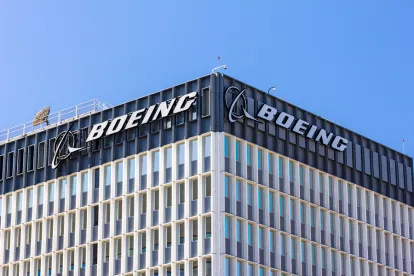Key Points
The US Department of Justice reported that it obtained a warrant for the seizure of a Boeing 737-7EM aircraft for the alleged violation of US export controls on Russia (rather than because of ownership of the aircraft by a sanctioned person).
Previously the US Department of Commerce, Bureau of Industry and Security (BIS) had identified US-produced aircraft, and foreign-produced aircraft that contain greater than 25 percent of controlled US-origin content by value, as having apparently violated the BIS’s export controls on Russia, with the announced effect that subsequent actions taken with respect to the listed aircraft, including maintenance, repair, refueling, and the provision of spare parts and services, are prohibited.
Overview
As we first discussed in our March 21 advisory, on February 24, in response to the invasion by Russia of Ukraine, the US Department of Commerce, Bureau of Industry and Security (BIS) issued new rules (the Rules). The Rules effectively prohibit the export, re-export or in-country transfer or use of Boeing (or other US-manufactured) aircraft (as well as other aircraft and aircraft components with at least 25 percent US content) in or to Russia without a license (which would generally be denied). On March 2, the BIS extended the Rules to Belarus and eliminated a previously existing license exception for temporary sojourns of aircraft in the fleet of Russian airlines. On March 18, the BIS issued a press release identifying nearly 100 US-manufactured aircraft (all Boeing except for one Gulfstream), most apparently on lease to Russian airlines, as having violated the Rules because such aircraft had since the issuance of the Rules flown from third countries into Russia (See the release). The effect of such violation is that such aircraft are thereafter prohibited from being sold, transferred, exported, re-exported, financed, ordered, bought, removed, concealed, stored, used, loaned, disposed of, transported, forwarded or otherwise serviced by any person anywhere who has knowledge of the violation (which the BIS notified the public of). 15 CFR § 736.2(b)(10). As such, the continued leasing and financing of such an aircraft by a person with knowledge of the violation would be prohibited without a license. However, such prohibition is not limited to aircraft having flown into Russia since the issuance of the Rules. It extends also to aircraft flying within Russia since the issuance of the Rules. The BIS has since updated the list of identified aircraft several times.
In an August 2 press release, the US Commerce Department updated its list of aircraft that have flown into Russia or Belarus in apparent violation of Export Administration Regulations by adding the first 25 foreign-produced aircraft that the BIS has identified as apparently violating the EAR’s de minimis threshold for US components. AVIATION ADVISORY 2 As we have pointed out in earlier advisories, the violations identified by the BIS consisted of flights of such aircraft from third countries to Russia. However, the transfer or use of any aircraft within Russia is also a violation of the Rules. This includes flights entirely within Russia. Any violation described in this paragraph gives rise to prohibitions under the Rules against leasing, financing and other activities with respect to the affected aircraft by parties having knowledge of the violation. So unless an aircraft in Russia has remained grounded since the Rules were issued, the continued leasing or financing of that aircraft (among other activities) by a party having knowledge that it had operated within Russia may be prohibited by US law.
Charging Letter
On August 31, the BIS issued a charging letter against Russian multinational oil and natural gas company LUKOIL over alleged re-exporting of a Boeing 737-7EM aircraft to Russia without a required BIS license. According to the charging letter, LUKOIL violated the Rules by re-exporting the aircraft by flying it from Dubai to Russia on or about March 12.
LUKOIL has been subject to sanctions imposed by the US Treasury Department’s Office of Foreign Assets Control (OFAC) since 2014 but it took some time for the US authorities to determine that the aircraft was ultimately its property as the ownership was obscured through a series of holding companies. According to the charging letter, the Boeing 737-7EM was manufactured in the United States circa 2006, and, in March 2007, the title to it has passed to AC Management Company Limited, a Cypriot company registered in the Cayman Islands as a foreign company. As LUKOIL was determined to be the ultimate parent of AC Management Company Limited, this finding supported the argument that, at the time of violation, LUKOIL effectively owned the aircraft.
BIS notified LUKOIL that if it failed to answer the charges within 30 days after being served with the charging letter, that failure would be treated as a default. If such default occurred, the administrative law judge may find the alleged charges are true without a hearing or a further notice to LUKOIL. The maximum penalties may then be imposed including, but not limited to, a civil penalty, denial of export privileges, exclusion of practice before BIS.
Warrant to Seize Aircraft
More significantly, the Department of Justice announced that it had obtained a warrant to seize the same aircraft. The US District Court for the Southern District of Texas found that there was probable cause of violations of the BIS Russian export controls because the aircraft operated without a license for export or re-export on March 8 and March 12 on flights from Moscow to Dubai and back. These violations supported the civil seizure of the aircraft pursuant to 50 U.S.C. § 4820(a)(5). See also, 50 U.S.C. § 4820(j) and 18 U.S.C. § 981(b)(1). The warrant for the seizure was issued by the US District Court for the Southern District of Texas because the aircraft had flown to Houston in 2019, and it was alleged the aircraft would be brought back to the Southern District of Texas in the future. The Court therefore implicitly found that there was venue in the Southern District of Texas for a forfeiture action pursuant to 18 U.S.C. §981(b)(3) and 28 U.S.C § 1355(b)(1)(B) and has such it had authority to issue the warrant. The warrant was issued notwithstanding the fact that the aircraft was believed to be in Russia at the time the warrant was issued.
The Task Force KleptoCapture is coordinating the seizure action, and the seizure matter is being investigated by the FBI’s Houston Field Office, the Department of Commerce’s Bureau of Industry and Security and US Immigrations and Customs Enforcement’s Homeland Security Investigations in Houston. The US Department of Justice (US Attorney’s Office Southern District of Texas) provided commentary in a press release issued by on August 31. No further action by the US Department of Justice has been announced since then.
Conclusion
It is important to note that the violation that led to the issuance of the warrant for the seizure of the aircraft was not its ultimate ownership by a sanctioned entity, but rather the violation by the aircraft (regardless of its ownership) of the prohibition on exports and re-exports to Russia. As noted above, this prohibition also extends to flights within Russia. So, a non-Russian leasing company is logically just as vulnerable as LUKOIL to a seizure 3 action. This may be particularly relevant for any aircraft stranded in Russia that may eventually make (or have made) their way out of the country.
As we pointed out in our earlier advisory, please note that other rules may apply to leasing and financing of commercial aircraft in Russia including the rules of the Office of Foreign Assets Control (OFAC) of the US Department of Treasury, and the rules issued by the European Union in response to the Russian invasion. Lessee parties to a leasing transaction, including airline majority shareholders, require screening against sanction regimes to ensure OFAC violations do not occur separate from the export licensing issues covered here.








 />i
/>i

